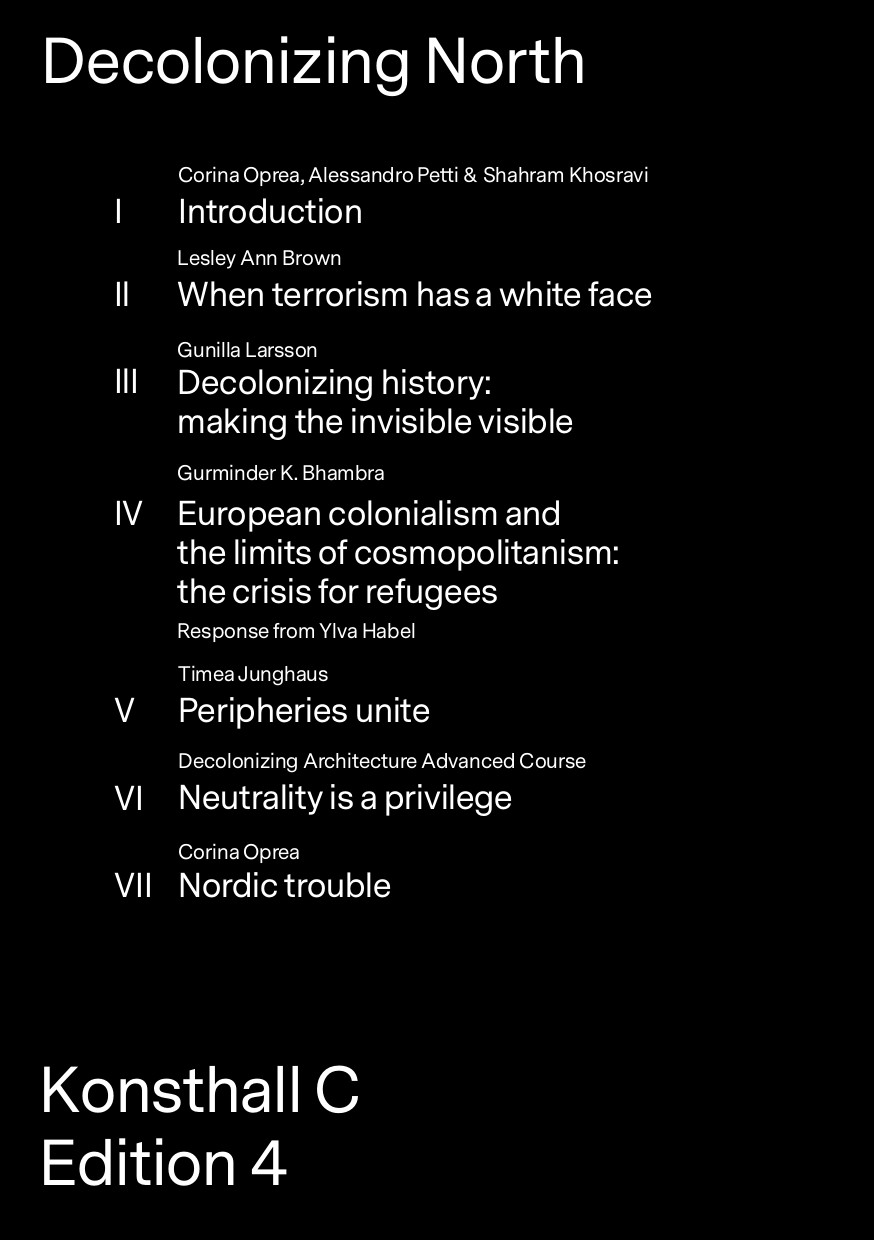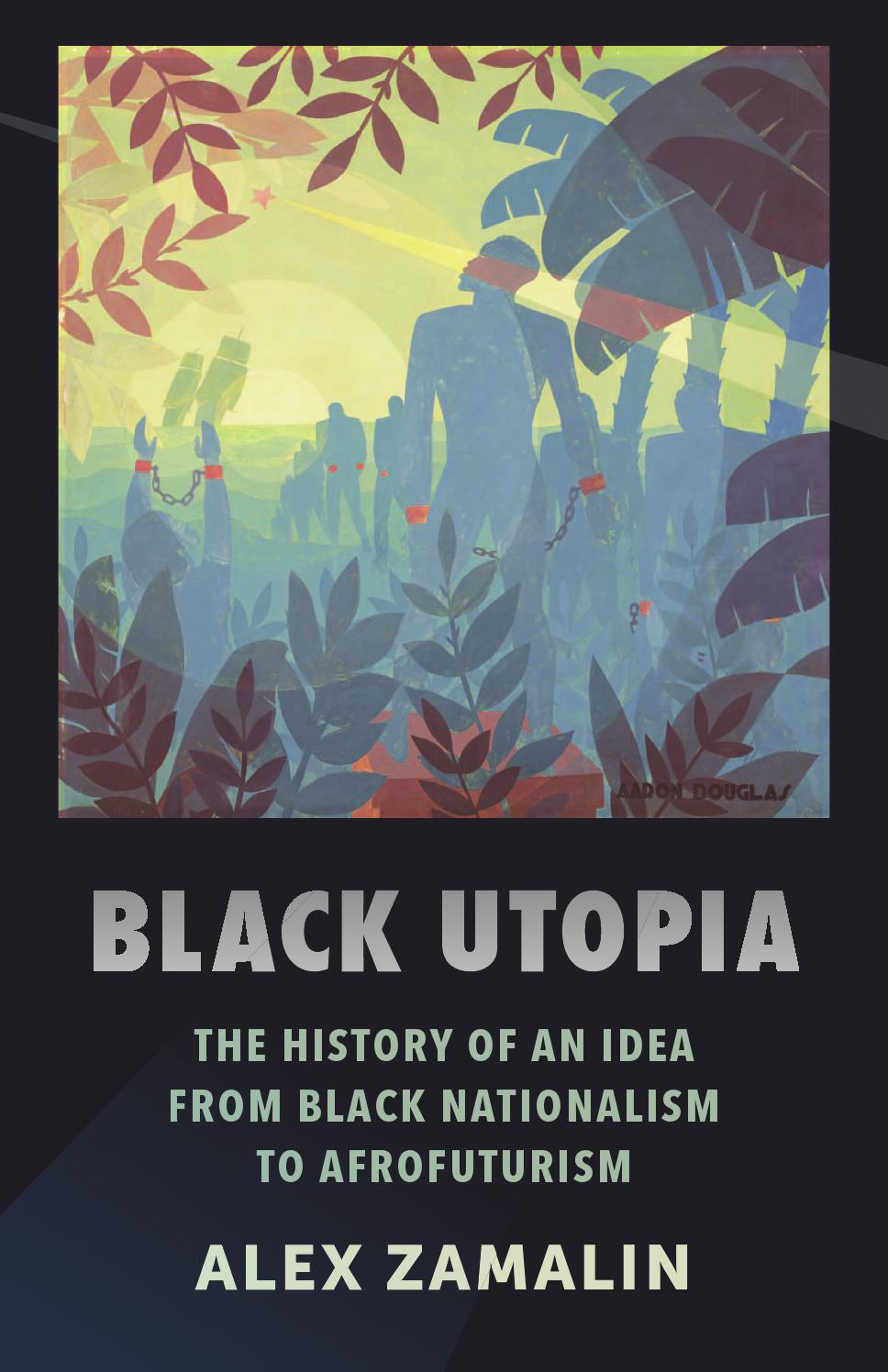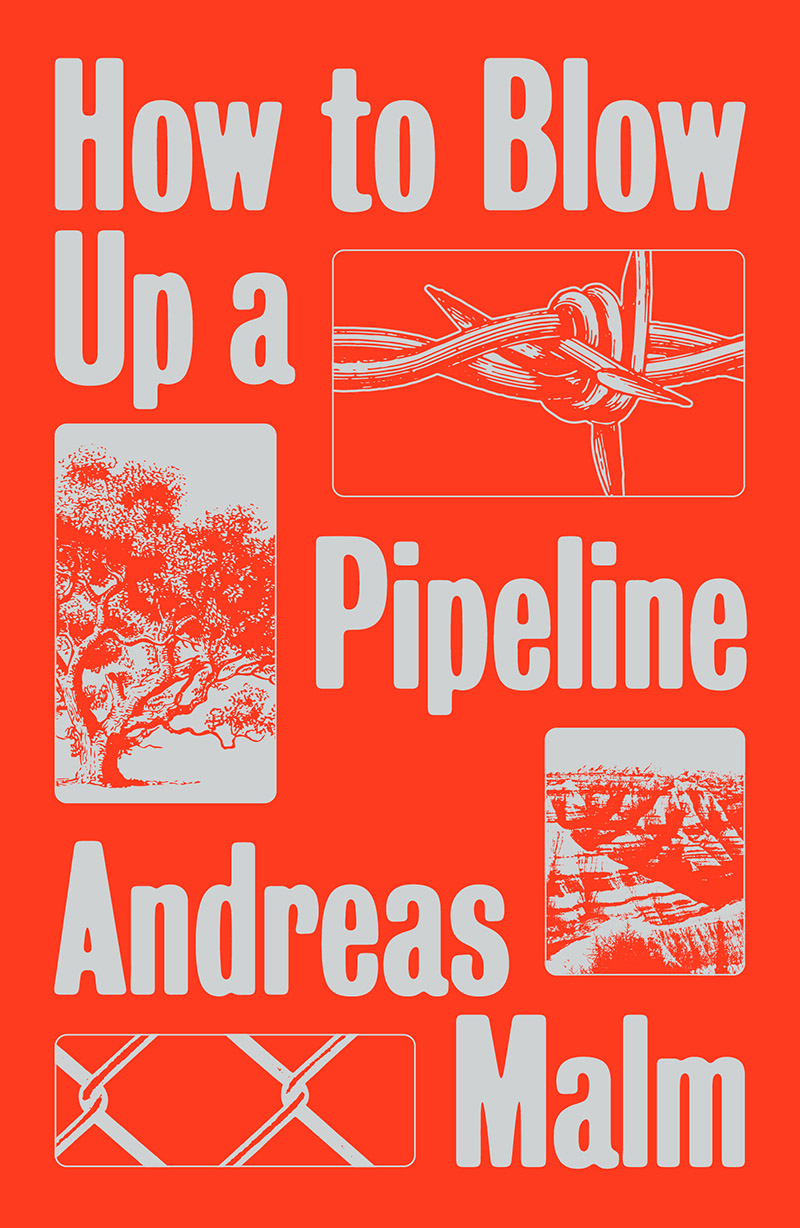Decolonizing North (2018)
Filed under book | Tags: · colonialism, decoloniality, nordics, racism, scandinavia

“The north is not only a geographical expression, it indicates often a power relation based on presumption of superiority. Despite violent border regimes and colonial processes on indigenous populations, northern European countries have scarcely dealt with their self-image of colonial powers. Is decolonization today a possible political project of liberation against this historical prejudice? What is at stake and how should we position ourselves within an imperative process of decolonization in relation to land and knowledge? In particular, how to de-align from the reproduction of oppressive structures and look instead to new alliances between native and migrants’ populations, and towards solidarity practices within art, discourse and immediate locality.
Addressing a range of topics in relation to contemporary colonial forms, inner-nordic colonialization of Sámi and Inuit, reflections on decolonizing terminologies, white supremacy the publication focuses on questions of decoloniality and its meaning for the particularities of North Europe today.”
Contributors: Lesley Ann Brown, Gunilla Larsson, Gurminder K. Bhambra, Ylva Habel, Timea Junghaus, Decolonizing Architecture Advanced Course, Corina Oprea.
Edited by Elof Hellström, Samuel Girma, Corina Oprea, and Alessandro Petti
Publisher Konsthall C, Stockholm, 2017
95 pages
Alex Zamalin: Black Utopia: The History of an Idea from Black Nationalism to Afrofuturism (2019)
Filed under book | Tags: · afrofuturism, black people, blackness, fiction, freedom, gender, human rights, literary criticism, race, science fiction, utopia

“Within the history of African American struggle against racist oppression that often verges on dystopia, a hidden tradition has depicted a transfigured world. Daring to speculate on a future beyond white supremacy, black utopian artists and thinkers offer powerful visions of ways of being that are built on radical concepts of justice and freedom. They imagine a new black citizen who would inhabit a world that soars above all existing notions of the possible.
In Black Utopia, Alex Zamalin offers a groundbreaking examination of African American visions of social transformation and their counterutopian counterparts. Considering figures associated with racial separatism, postracialism, anticolonialism, Pan-Africanism, and Afrofuturism, he argues that the black utopian tradition continues to challenge American political thought and culture. Black Utopia spans black nationalist visions of an ideal Africa, the fiction of W. E. B. Du Bois, and Sun Ra’s cosmic mythology of alien abduction. Zamalin casts Samuel R. Delany and Octavia E. Butler as political theorists and reflects on the antiutopian challenges of George S. Schuyler and Richard Wright. Their thought proves that utopianism, rather than being politically immature or dangerous, can invigorate political imagination. Both an inspiring intellectual history and a critique of present power relations, this book suggests that, with democracy under siege across the globe, the black utopian tradition may be our best hope for combating injustice.”
Publisher Columbia University Press, New York, 2019
ISBN 9780231187404, 0231187408
x+182 pages
Reviews: Smaran Dayal (Social Text, 2020), David A. Lemke (Utopian Studies, 2020), Francis Shor (J American History, 2020), Ladee Hubbard (TLS, 2019).
Comment (0)Andreas Malm: How to Blow Up a Pipeline: Learning to Fight in a World on Fire (2021)
Filed under book | Tags: · activism, climate, climate crisis, direct action, disobedience, oil, property, protest, sabotage, social movements, violence

“Why resisting climate change means combatting the fossil fuel industry
The science on climate change has been clear for a very long time now. Yet despite decades of appeals, mass street protests, petition campaigns, and peaceful demonstrations, we are still facing a booming fossil fuel industry, rising seas, rising emission levels, and a rising temperature. With the stakes so high, why haven’t we moved beyond peaceful protest?
In this lyrical manifesto, noted climate scholar (and saboteur of SUV tires and coal mines) Andreas Malm makes an impassioned call for the climate movement to escalate its tactics in the face of ecological collapse. We need, he argues, to force fossil fuel extraction to stop—with our actions, with our bodies, and by defusing and destroying its tools. We need, in short, to start blowing up some oil pipelines.
Offering a counter-history of how mass popular change has occurred, from the democratic revolutions overthrowing dictators to the movement against apartheid and for women’s suffrage, Malm argues that the strategic acceptance of property destruction and violence has been the only route for revolutionary change. In a braided narrative that moves from the forests of Germany and the streets of London to the deserts of Iraq, Malm offers us an incisive discussion of the politics and ethics of pacifism and violence, democracy and social change, strategy and tactics, and a movement compelled by both the heart and the mind. Here is how we fight in a world on fire.”
Publisher Verso Books, London, January 2021
ISBN 9781839760259
136 pages
HT pht
Interviews with author: Wen Stephenson (LA Review of Books, Jan 2021), Politics Theory Other (Jan 2021, audio), Sarah Swackhamer (Houston Review of Books, Jan 2021, with audio)
Reviews: Scott W. Stern (LA Review of Books, Jan 2021), Tatiana Schlossberg (New York Times, Jan 2021), George Buskell (Polit Econ Research Centre, Jan 2021), Alan Thornett (Global Ecosocialist Network, Feb 2021), Jess Walsh (Socialist Workers Party, Apr 2021), Benjamin Kunkel (New Republic, May 2021).
Book roundtable: Graeme Hayes, Alice Swift, R.H. Lossin (Verso, Jan-Feb 2021).
Response to critics: Andreas Malm (Verso Blog, Apr 2021)
EPUB (updated on 2021-8-17)
See also Malm and The Zetkin Collective’s White Skin, Black Fuel (2021).
Comment (1)
